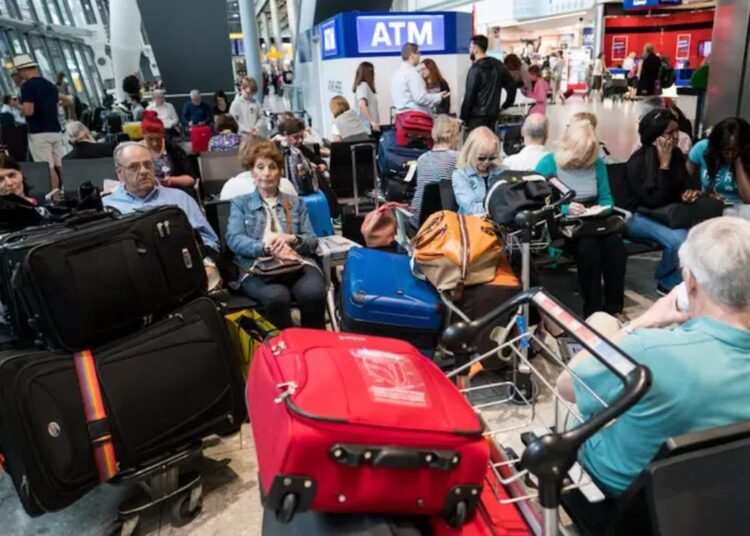
By Mohamed Attia
The major international airports have begun to pay the bill for their lack of good preparation for the recovery of air traffic, after the repercussions of the coronavirus pandemic receded during the current period.
Perhaps what was announced by the authorities of Heathrow Airport in London to a number of airlines operating there by limiting and reducing the daily operating capacity at the airport proves the mistake made by international airports and airlines when they dispensed with trained workers due to the financial losses caused by the repercussions of the coronavirus.
According to statistics issued by the European Airports Association, 66 per cent of European airports are experiencing confusion in their flights between delays and cancellations, as well as the delay of passengers’ bags through a number of major European airports in Britain, Germany, France, the Netherlands, Belgium, Spain and others while thousands of flights in both America and Canada have been subject to delays.

Perhaps the scene of flight delays and the reduction of their numbers has become a repetitive image witnessed by international airports.
British airports are witnessing the cancellation and delay of thousands of flights during the past weeks.
British Airways was also forced to cancel thousands of flights during the current summer season.
The authorities of Gatwick Airport also announced that it will put a cap on departure and landing flights this summer and will allow about 825 departure and landing flights only in July, and allow only about 850 daily operations in August.
Germany’s airports are also experiencing flight disruption as Lufthansa announced that it will cancel nearly 1,000 flights this July due to the lack of trained staff.
This will mainly affect the two main airports in Germany, Frankfurt and Munich, especially on weekends, the company announced.
The German company announced that it would hire about 2,000 trained workers from Turkey to work in German airports to fill the shortage of workers in them.
The state of confusion in German airports has led to the cancellation of thousands of flights in the past few weeks for Lufthansa, and the CEO of the company, Carsten Spohr, apologised to travellers for the chaos.
He stressed that Lufthansa is currently recruiting new employees, especially in Europe, but stressed that the results of recruitment will not bear the desired fruits except in the winter season.
At the French Charles de Gaulle airport, the travel crisis worsened, as many flights were cancelled with the last-minute cancellations continuing, as the lack of staff led to the adjustment of operating schedules with some labour strikes.
The French Civil Aviation Authority asked to reduce flights by 17% from Charles de Gaulle Airport due to the firefighters’ strike.
KLM cancelled about 62 flights, while maintaining the operation of long flights and 90% of short and medium flights
In Belgium, Brussels Airport is facing severe travel disruptions, and the airport has already seen at least 315 flights cancelled, confusing the travel plans of more than 40,000 passengers.
In the United States of America, American airlines cancelled more than 1,100 flights, and delayed about 22,000 flights during the past weeks due to the lack of crews working for airlines. In Canada, 54% of flights were affected at 6 major Canadian airports.

It is noteworthy that the crisis exacerbated with the return of travel and its recovery strongly in most parts of the world after the pandemic, as it became clear the need for a greater number of trained employees to operate airports and airline flights, which has become urgent after the global aviation industry dispensed with 4 million workers and employees since the beginning of the pandemic.
For its part, the European Pilots Association warned of the current pressures in the aviation industry, and the dangers of confusion in European airports, considering that the current situation threatens the safety of air traffic.
Tanya Harter, director of the association, said that the increased workload on pilots and staff at airports may turn into weaknesses in flight operations due to lack of staff, which increases the possibility of errors.
Harter pointed out that if errors accumulate, this could eventually lead to serious accidents, especially with the increase in overtime hours, for most workers in the aviation and airports sector.
Harter pointed out that there are long queues, delays and thousands of flight cancellations in many airports in Europe, especially in Germany, explaining that the main reason is the lack of staff, especially among ground service providers and also in the aviation field as a whole.
Harter explained the current crisis that many airlines and airports have provided a large number of workers
The transit movement is also witnessing turmoil in many airports in light of this exceptional situation. Among the airports that will be affected by this turmoil is Cairo International Airport, as well as EgyptAir flights to and from Europe, where EgyptAir operates weekly to European airports about 174 flights per week during this summer.






Discussion about this post